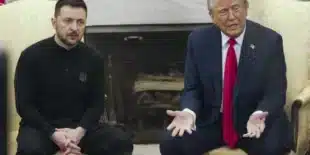Ecuador’s already precarious security situation worsened dramatically this week, marked by a dramatic incident where armed men with explosives attacked a television station during a live broadcast.
The nation has been experiencing a surge in violence, including explosions, abductions of police officers, and prison riots, as authorities struggle to maintain control. The escape of a notorious drug lord from prison catalyzed the current crisis, although Ecuador has been grappling with increasing instability for years.
Historically known as a peaceful haven between major cocaine producers Peru and Colombia, Ecuador’s deep ports and dollarized economy have transformed it into a crucial transit hub for cocaine destined for the United States and Europe. This has also made it an attractive location for money laundering by traffickers.
Ecuadorian gangs have allied with international criminal organizations, including Mexican cartels, Brazilian urban gangs, and Albanian mafia cells. This has led to a violent struggle for control over drug trafficking routes, with these groups engaging in public and brutal violence on the streets and in prisons.
Ecuador’s prisons, long plagued by violence, have become battlegrounds where inmates, often aligned with gangs, control sections of the facilities and operate criminal networks from behind bars.
The nation’s security and state forces are ill-equipped to handle the rise of these criminal groups, lacking in training, strategy, and proper equipment. Compounding these challenges are corruption allegations within Ecuador’s justice and security system, leading to the US withdrawing visas from high-ranking Ecuadorian security officers and legal professionals linked to drug trafficking.
Former President Guillermo Lasso’s implementation of states of emergency failed to curb the violence, leading to a decline in his popularity and his call for early elections on August 20, 2023.
The campaign period saw politically charged violence, including the assassination of presidential candidate Fernando Villavicencio and other politicians, indicating the use of violence by criminal groups to influence policy.
President Daniel Noboa, who won the election on a platform of combating crime, now faces a daunting crisis.
The catalyst for the recent escalation was the prison escape of Adolfo “Fito” Macías, leader of the feared Los Choneros gang, on Sunday from a Guayaquil prison. Macías, linked to drug trafficking networks in Mexico and the US, had been serving a 34-year sentence for crimes including drug trafficking and murder.
In response, President Noboa declared a national state of emergency, deploying over 3,000 police and armed forces personnel to recapture Macías. This was followed by incidents in multiple prisons and a wave of violent attacks by criminal groups across the country.
In Guayaquil, considered Ecuador’s most dangerous city, the violence claimed at least eight lives, including kidnappings of police officers. Police have arrested 13 individuals in connection with the assault on a police station, seizing firearms and grenades.
President Noboa declared an “internal armed conflict,” directing security forces to target several criminal groups responsible for the violence. The 60-day state of emergency includes a nightly curfew and gives security forces extensive powers.
Adm. Jaime Vela Erazo, head of Ecuador’s Armed Forces, vowed a relentless approach against these groups, emphasizing the nation’s future is at stake.
The crisis has raised alarms regionally, with neighboring Colombia and Peru expressing support for Noboa’s efforts to restore order. Peru plans to declare an emergency along its border with Ecuador and has ordered increased border security.
The United States has also expressed support, with a State Department official stating the US is ready to assist the Ecuadorian government.


